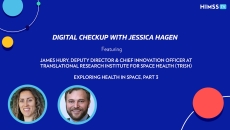Decision Support
NLP can help providers make gains with social determinants of health, population health analytics, predictive analytics, real-time clinical decision support and precision medicine, says Dr. Calum Yacoubian, director of healthcare strategy at IQVIA.
SPONSORED
Advanced medication decision support tools are emerging as an enabler for the digital maturity journey of many leading hospitals. From improving patient care to reducing alert fatigue for clinicians, they are driving change throughout the care continuum.
The Translational Research Institute for Space Health and its partners have big plans in the coming years, says Director and Chief Innovation Officer James Hury, who shares what excites him about new avenues in space flight.
Leveraging AI, machine learning and neural networks can help healthcare standardize data, comply with info blocking requirements and improve health outcomes.
LA Children's received the funding to predict how critically ill children handle medication by applying machine learning to identify clinically significant patterns from the ICU data of 20,000 patients.
Resource constraints and inefficient manual processes are burdening cancer centers across the U.S., but a new report shows how machine learning capabilities outside of EHRs could help improve agility.
A letter from the HIMSS EHR Association outlines concerns and requests clarifications around issues such as automation bias and how the industry would transition away from legacy technologies that conflict with the guidance.
While understanding and reconciling drugs after discharge from the hospital can be challenging, it's a necessity for greater efficacy of care delivery. HL7's Da Vinci project can help.
The cloud-based platform provides security, scale and the processing power needed for genomic data storage and analyses, eliminating the need for specialized infrastructure and workflows.
Its new Advanced Visualization Workspace includes dozens of clinical apps for cardiology, oncology, neurology and radiology.










